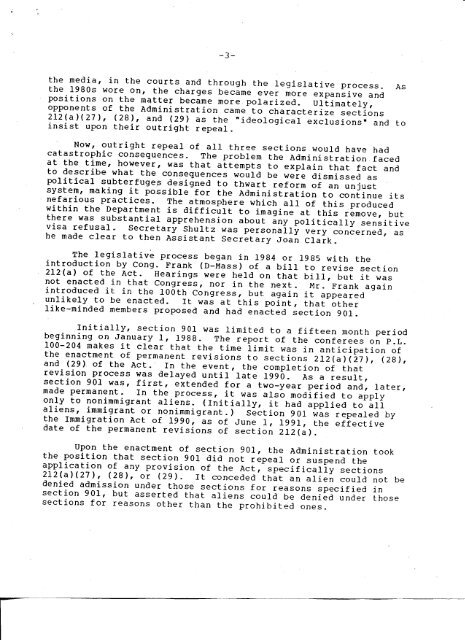linked - Investigating the Terror
linked - Investigating the Terror
linked - Investigating the Terror
You also want an ePaper? Increase the reach of your titles
YUMPU automatically turns print PDFs into web optimized ePapers that Google loves.
-3-<br />
<strong>the</strong> media, in <strong>the</strong> courts and through <strong>the</strong> legislative process. As<br />
<strong>the</strong> 1980s wore on, <strong>the</strong> charges became ever more expansive and<br />
positions on <strong>the</strong> matter became more polarized. Ultimately,<br />
opponents of <strong>the</strong> Administration came to characterize sections<br />
212(a)(27), (28), and (29) as <strong>the</strong> "ideological exclusions" and to<br />
insist upon <strong>the</strong>ir outright repeal.<br />
Now, outright repeal of all three sections would have had<br />
catastrophic consequences. The problem <strong>the</strong> Administration faced<br />
at <strong>the</strong> time, however, was that attempts to explain that fact and<br />
to describe what <strong>the</strong> consequences would be were dismissed as<br />
political subterfuges designed to thwart reform of an unjust<br />
system, making it possible for <strong>the</strong> Administration to continue its<br />
nefarious practices. The atmosphere which all of this produced<br />
within <strong>the</strong> Department is difficult to imagine at this remove, but<br />
<strong>the</strong>re was substantial apprehension about any politically sensitive<br />
visa refusal. Secretary Shultz was personally very concerned, as<br />
he made clear to <strong>the</strong>n Assistant Secretary Joan Clark.<br />
The legislative process began in 1984 or 1985 with <strong>the</strong><br />
introduction by Cong. Frank (D-Mass) of a bill to revise section<br />
212(a) of <strong>the</strong> Act. Hearings were held on that bill, but it was<br />
not enacted in that Congress, nor in <strong>the</strong> next. Mr. Frank again<br />
introduced it in <strong>the</strong> 100th Congress, but again it appeared<br />
unlikely to be enacted. It was at this point, that o<strong>the</strong>r<br />
like-minded members proposed and had enacted section 901.<br />
Initially, section 901 was limited to a fifteen month period<br />
beginning on January 1, 1988. The report of <strong>the</strong> conferees on P.L.<br />
100-204 makes it clear that <strong>the</strong> time limit was in anticipation of<br />
<strong>the</strong> enactment of permanent revisions to sections 212(a)(27), (28),<br />
and (29) of <strong>the</strong> Act. In <strong>the</strong> event, <strong>the</strong> completion of that<br />
revision process was delayed until late 1990. As a result,<br />
section 901 was, first, extended for a two-year period and, later,<br />
made permanent. In <strong>the</strong> process, it was also modified to apply<br />
only to nonimmigrant aliens. (Initially, it had applied to all<br />
aliens, immigrant or nonimmigrant.) Section 901 was repealed by<br />
<strong>the</strong> Immigration Act of 1990, as of June 1, 1991, <strong>the</strong> effective<br />
date of <strong>the</strong> permanent revisions of section 212 (a).<br />
Upon <strong>the</strong> enactment of section 901, <strong>the</strong> Administration took<br />
<strong>the</strong> position that section 901 did not repeal or suspend <strong>the</strong><br />
application of any provision of <strong>the</strong> Act, specifically sections<br />
212(a)(27), (28), or (29). It conceded that an alien could not be<br />
denied admission under those sections for reasons specified in<br />
section 901, but asserted that aliens could be denied under those<br />
sections for reasons o<strong>the</strong>r than <strong>the</strong> prohibited ones.


